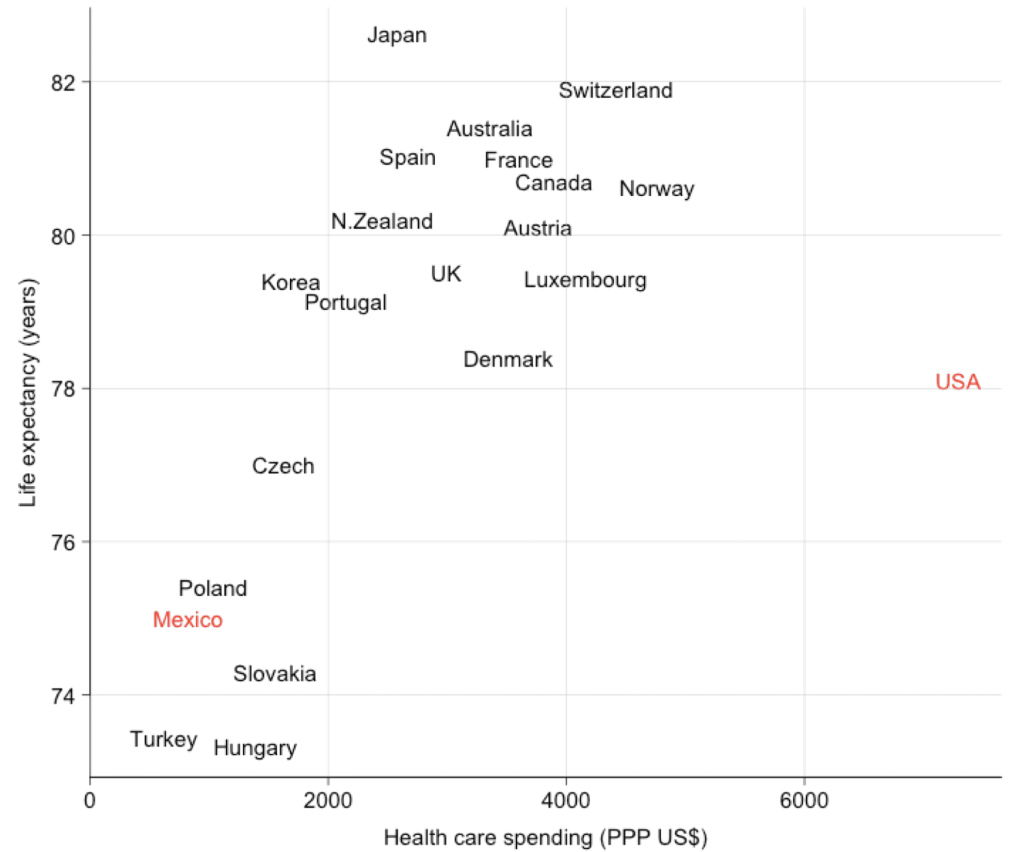tl;dr. A document saying it opposes the conventional wisdom on U.S. health care spending actually, in my view, supports the conventional wisdom on U.S. health care spending.
The conventional wisdom (which I agree with)
The conventional wisdom is that Americans spend too much on health care and get too little. This conventional wisdom resonates with just about anyone who’s ever had to deal with the U.S. healthcare system, also there are graphs like this one, based on data from 2007:
The story
An anonymous correspondent points us to this analysis of U.S. healthcare costs that argues against the conventional wisdom of the reason for these healthcare costs, instead making the point that richer countries spend more on health care than poorer countries, and the U.S. is one of the richest countries in the world, so we spend a lot, so the U.S. doesn’t stand out at all from the crowd:
I don’t quite buy the above graph, as the line going through USA seems reliant on the iffy quadratic term in the regression—but even if you draw a straight line and drop the mysterious “ARE” point, the USA would not be much higher than the fitted line, only 10%-15% higher, it appears.
What does the U.S. get out of all that spending? The author of that post seems to agree that we don’t get much, writing:
America’s mediocre health outcomes can be explained by rapidly diminishing returns to spending and behavioral (lifestyle) risk factors, especially obesity, car accidents, homicide, and (most recently) drug overdose deaths. . . . The diminishing returns are evident in cross-sectional analysis:
In the earlier graph shown above, Luxembourg and Norway are also on the high end of spending relative to life expectancy, but nothing compared to the United States.
My take
My main reaction is that the main take-home point of the post is the above-cited bit about diminishing returns, which seems consistent with the conventional wisdom that the U.S. overpays for health care. Maybe Luxembourg and Norway do so too, to a lesser extent, but that doesn’t make me feel any better!
This connects to a general statistical issue that came up a few years ago, which we called the “all else equal” fallacy. The comparison of the U.S. to other countries convincingly shows that richer countries tend to spend a greater proportion of their consumption on health care, with the U.S. not standing out much except for being richer. But, as discussed above, I think this is all consistent with the conventional wisdom that we’re overpaying. Indeed I think this conventional wisdom is supported by the argument in the linked post about diminishing returns to health-care spending.
To put it another way: we in the U.S. are overpaying for health care. It might be that as other countries get as rich as we are now, they’ll overpay too, just like we do! Or maybe not. Maybe they’ll learn from our experience and decide not to spend an increasing share of their consumption on aspects of health care that aren’t improving health.
I like the general approach of the above-linked post, which is data-focused, and all about drawing the most direct inferences from available data rather than being flashily counterintuitive. It just seems to me that the title of the post, “Why conventional wisdom on health care is wrong,” does not fit its content.
The political angle
There’s also a political angle here that I don’t fully understand.
It seems to be a position on the left or center-left who argue that U.S. health care spending is out of control, and a position on the right or center-right that our system is just fine.
I kind of get this correlation. Until the Obama-era health-care law, the alternative to the U.S. system was considered to be some sort of socialized system, a national insurance or Medicare for all, and often these proposals were motivated by comparisons to Canada, France, or other systems. So if you’re a U.S. liberal, it makes sense to view the American system as worse than that in these other countries, whereas if you’re a U.S. conservative, it makes sense to argue that, despite appearances, our system is just fine, perhaps even better than elsewhere.
On the other hand, now that we have some sort of universal health insurance, maybe there’s motivation for liberals to say good things about our system and for conservatives to complain.
But, beyond all this, there’s a lot of government involvement in the U.S. health care system. Consider all the weird results of Medicare spending rules, which somehow percolate through the entire system. It would seem very natural for a liberal or a conservative to attribute some of the problems with our current system to a tangled bureaucracy. To support our crappy system just cos it’s not officially socialist . . . that just seems like a mistake. Go back to the above-linked post, see the bit about diminishing returns and the bit about richer countries being willing to spend more, put that together and you can see what a mess we’ve gotten into here! From the other direction, there’s no reason for people who see problems with our health-care system to think they need to argue with many of the points in that post.



